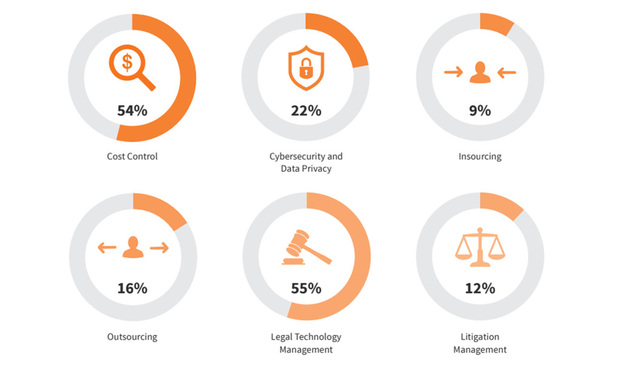Legal Ops Leaders Say Blockchain, AI Still Not Mainstream in Their Companies
Those are some of the key findings in the 2019 Consero Legal Operations Survey Report, based on a poll of 85 legal-ops executives who attended a recent forum.
February 01, 2019 at 02:00 AM
5 minute read
The original version of this story was published on Corporate Counsel
 Legal ops chiefs' top priorities in the next 12 months. (Courtesy photo)
Legal ops chiefs' top priorities in the next 12 months. (Courtesy photo)
In-house legal operations chiefs see their main priorities as managing legal technology and cost-cutting, primarily on outside counsel spending. Blockchain remains a confusing concept to them, while artificial intelligence is the hottest topic of conversation.
Those are some of the key findings in the 2019 Consero Legal Operations Survey Report, based on a poll of 85 legal-ops executives who attended a recent forum. Consero Group presents executive conferences, and it did the report in partnership with Thomson Reuters Legal Tracker.
 John Pfannenbecker (Courtesy photo)
John Pfannenbecker (Courtesy photo)Many of its findings ring true to one participant, John Pfannenbecker, deputy general counsel for legal operations and business affairs at World Franchise Inc., parent company of the Subway restaurant chain based in Milford, Connecticut.
“The findings are pretty consistent with what I've been hearing from colleagues,” Pfannenbecker said in an interview this week. “Cost control is my top priority, so I wasn't surprised to see that from a large percentage of others.”
The findings also coincide with what last year's Consero survey found. The 2019 report showed most participants cited legal tech management and cost control as their top priorities, followed by cybersecurity and data privacy. “Cyber and data privacy was handled in our legal department at one time,” Pfannenbecker said, “but we separated it out and gave it to the [information technology] department. But there are in-house attorneys still in it.”
He said he's been doing legal tech work eight years at his company, and “the first five years I didn't realize there was a separate thing called legal ops. That's how new this is.”
The survey said the majority of respondents, 65 percent, reported their companies are just developing legal ops or are in the early stages of adopting it. Another 29 percent called their operations “mature,” while only 6 percent said it was “very mature.”
Pfannenbecker noted, “My team and my chief legal officer think we are so far behind other companies, and then I go to forums like this and see we are as mature or farther advanced than others.”
He said he spends about 75 percent of his time overseeing and managing the legal operations with a team that includes two other full-time people and one part-timer. “I also act as a traditional in-house counsel on financing and commercial transactions about 25 percent of the time,” he added.
The report said 38 percent of companies dedicate two to five staff members to legal ops. About 34 percent only have one legal tech staffer, while 13 percent said they have over 10.
A whopping 71 percent of respondents said their legal technology infrastructure does not meet the needs of their operations. But 74 percent also reported that they expect legal technology spend to increase in the next 12 months.
“I agree that legal tech infrastructure is a concern for nearly all legal ops departments,” Pfannenbecker said. “Some companies are just now implementing things we implemented years ago.”
He explained his company uses matter management and e-billing software along with contract management, which are the most common form of legal tech in use.
The survey said 95 percent of the respondents do not use blockchain. “The forum had a breakout session on blockchain,” Pfannenbecker said, “and it's still very confusing as to how it applies to legal departments and workflows. But I think, once people understand what it does, they will say, 'Oh, yes, we have something like that.' Only about five percent of them really understand it right now.”
The survey showed that 64 percent of respondents said they were considering use of artificial intelligence. “That's one of the hottest topics talked about,” Pfannenbecker said. “We're considering it too, but getting people to move to those types of solutions is very difficult.”
He said some troubling questions include should companies trust AI to do certain jobs, will there be a return on investment to justify the cost, and what could companies do about the human beings it could replace.
“Those are leaps that are harder for nontech companies to take,” he added. “It's easier for tech companies because it's in their culture.”
The next big thing for most companies, including his, is better use of metrics, he said. Besides e-billing, he said his team is looking at what metrics matter most to legal and what does the business side need to see.
The report said 80 percent of respondents do not have a metrics program that measures the value delivered by legal ops.
It concluded, “Using the right technology tools and deriving actionable insight from metrics will allow legal ops executives to support their legal departments efficiently and effectively to protect and grow their companies.”
This content has been archived. It is available through our partners, LexisNexis® and Bloomberg Law.
To view this content, please continue to their sites.
Not a Lexis Subscriber?
Subscribe Now
Not a Bloomberg Law Subscriber?
Subscribe Now
NOT FOR REPRINT
© 2025 ALM Global, LLC, All Rights Reserved. Request academic re-use from www.copyright.com. All other uses, submit a request to [email protected]. For more information visit Asset & Logo Licensing.
You Might Like
View AllTrending Stories
- 1Stevens & Lee Names New Delaware Shareholder
- 2U.S. Supreme Court Denies Trump Effort to Halt Sentencing
- 3From CLO to President: Kevin Boon Takes the Helm at Mysten Labs
- 4How Law Schools Fared on California's July 2024 Bar Exam
- 5'Discordant Dots': Why Phila. Zantac Judge Rejected Bid for His Recusal
Who Got The Work
Michael G. Bongiorno, Andrew Scott Dulberg and Elizabeth E. Driscoll from Wilmer Cutler Pickering Hale and Dorr have stepped in to represent Symbotic Inc., an A.I.-enabled technology platform that focuses on increasing supply chain efficiency, and other defendants in a pending shareholder derivative lawsuit. The case, filed Oct. 2 in Massachusetts District Court by the Brown Law Firm on behalf of Stephen Austen, accuses certain officers and directors of misleading investors in regard to Symbotic's potential for margin growth by failing to disclose that the company was not equipped to timely deploy its systems or manage expenses through project delays. The case, assigned to U.S. District Judge Nathaniel M. Gorton, is 1:24-cv-12522, Austen v. Cohen et al.
Who Got The Work
Edmund Polubinski and Marie Killmond of Davis Polk & Wardwell have entered appearances for data platform software development company MongoDB and other defendants in a pending shareholder derivative lawsuit. The action, filed Oct. 7 in New York Southern District Court by the Brown Law Firm, accuses the company's directors and/or officers of falsely expressing confidence in the company’s restructuring of its sales incentive plan and downplaying the severity of decreases in its upfront commitments. The case is 1:24-cv-07594, Roy v. Ittycheria et al.
Who Got The Work
Amy O. Bruchs and Kurt F. Ellison of Michael Best & Friedrich have entered appearances for Epic Systems Corp. in a pending employment discrimination lawsuit. The suit was filed Sept. 7 in Wisconsin Western District Court by Levine Eisberner LLC and Siri & Glimstad on behalf of a project manager who claims that he was wrongfully terminated after applying for a religious exemption to the defendant's COVID-19 vaccine mandate. The case, assigned to U.S. Magistrate Judge Anita Marie Boor, is 3:24-cv-00630, Secker, Nathan v. Epic Systems Corporation.
Who Got The Work
David X. Sullivan, Thomas J. Finn and Gregory A. Hall from McCarter & English have entered appearances for Sunrun Installation Services in a pending civil rights lawsuit. The complaint was filed Sept. 4 in Connecticut District Court by attorney Robert M. Berke on behalf of former employee George Edward Steins, who was arrested and charged with employing an unregistered home improvement salesperson. The complaint alleges that had Sunrun informed the Connecticut Department of Consumer Protection that the plaintiff's employment had ended in 2017 and that he no longer held Sunrun's home improvement contractor license, he would not have been hit with charges, which were dismissed in May 2024. The case, assigned to U.S. District Judge Jeffrey A. Meyer, is 3:24-cv-01423, Steins v. Sunrun, Inc. et al.
Who Got The Work
Greenberg Traurig shareholder Joshua L. Raskin has entered an appearance for boohoo.com UK Ltd. in a pending patent infringement lawsuit. The suit, filed Sept. 3 in Texas Eastern District Court by Rozier Hardt McDonough on behalf of Alto Dynamics, asserts five patents related to an online shopping platform. The case, assigned to U.S. District Judge Rodney Gilstrap, is 2:24-cv-00719, Alto Dynamics, LLC v. boohoo.com UK Limited.
Featured Firms
Law Offices of Gary Martin Hays & Associates, P.C.
(470) 294-1674
Law Offices of Mark E. Salomone
(857) 444-6468
Smith & Hassler
(713) 739-1250






